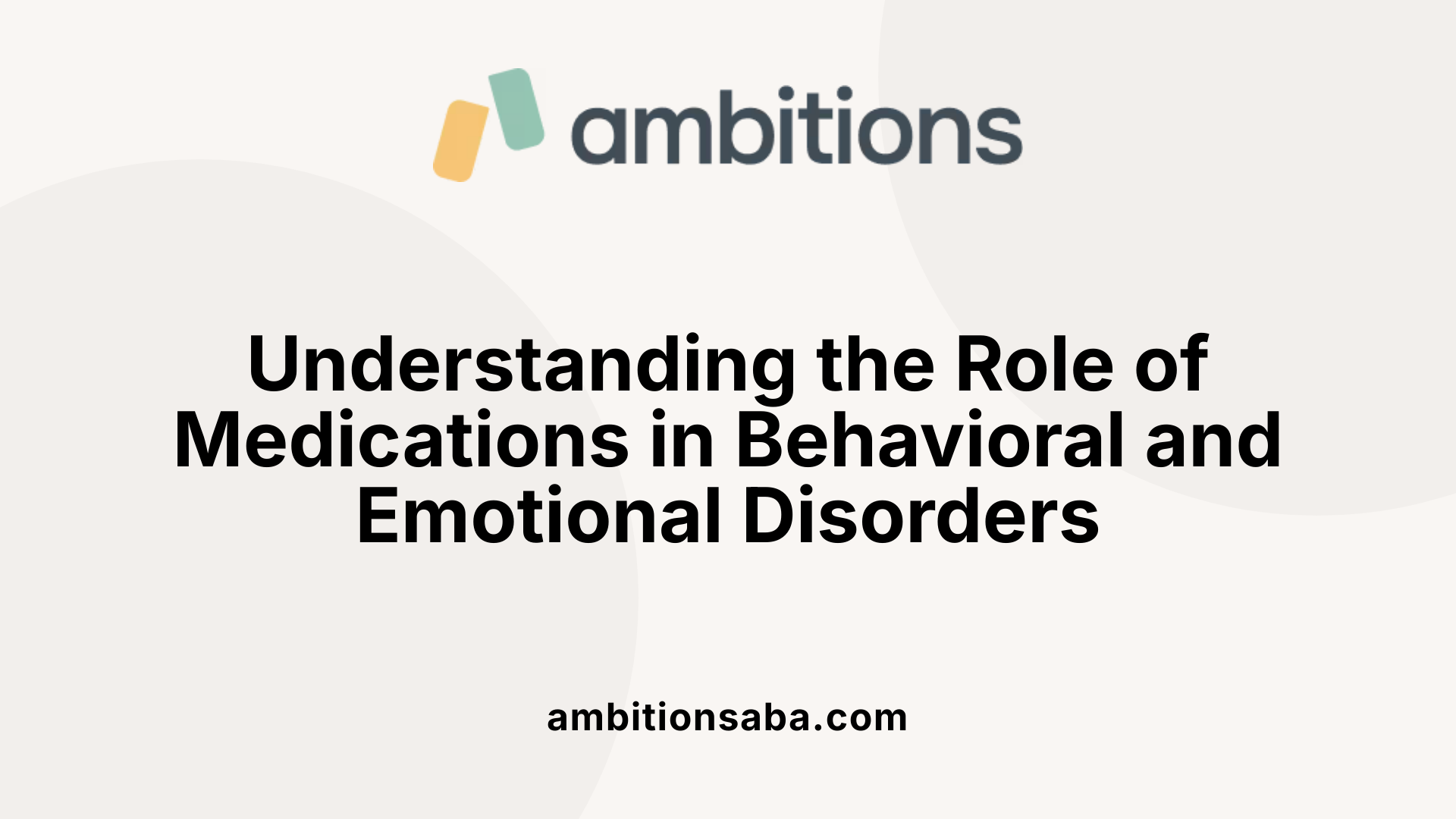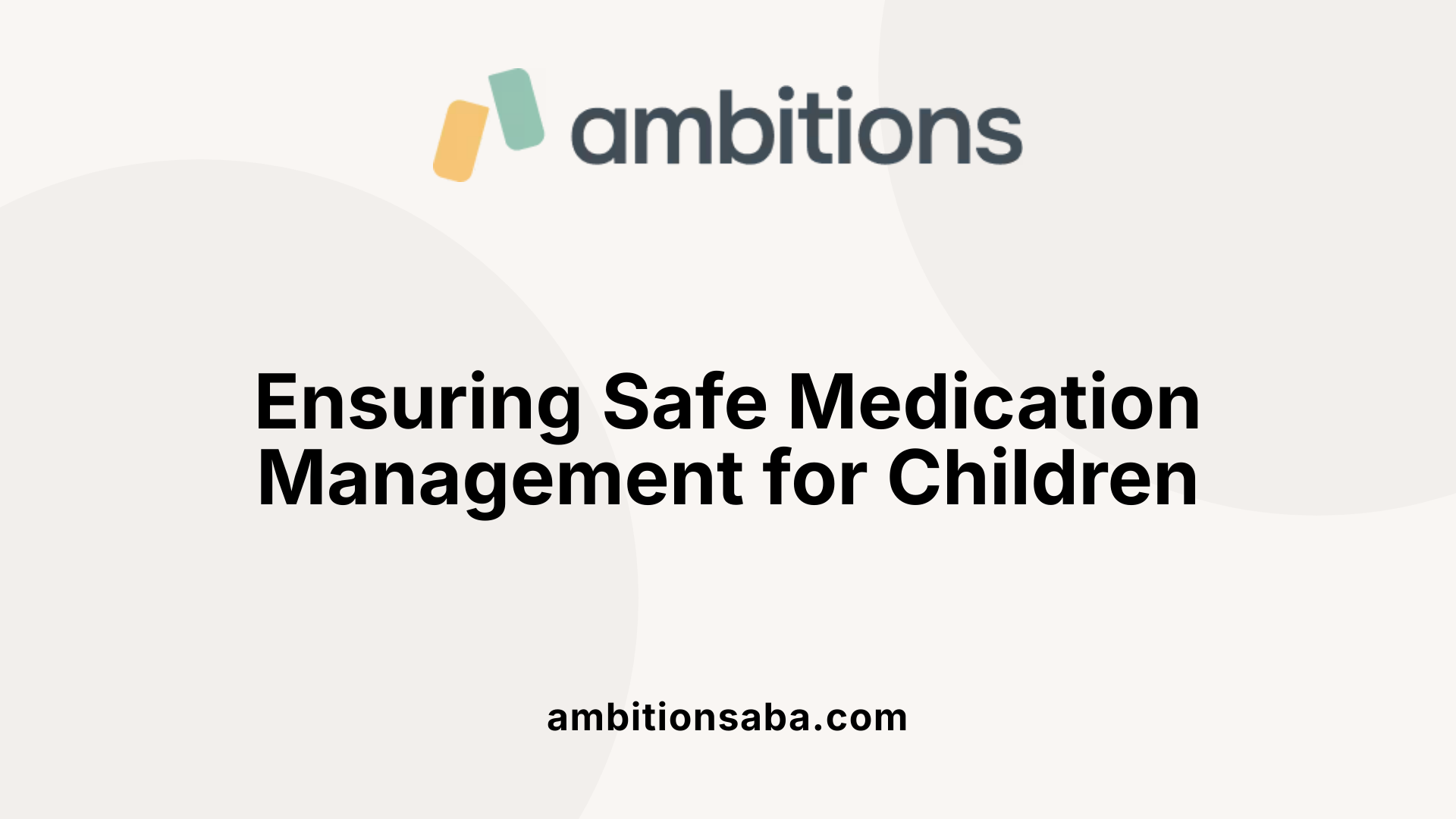Understanding the Balance Between Medication and Behavioral Support
Supporting children through medication changes is a nuanced process that combines careful planning, collaboration among healthcare providers, educators, and families, and continuous observation. While medication can offer symptom relief and help children function more effectively, it is essential to integrate behavioral therapies and family support to ensure safe and effective treatment. This article explores strategies, clinical practices, and considerations for supporting children as they transition through medication adjustments, highlighting the importance of comprehensive evaluation and evidence-based approaches.
When to Consider Medication for Children with Behavior Problems
When should I medicate my child with behavior problems?
Deciding to medicate a child with behavioral or emotional issues requires careful consideration by healthcare professionals and parents. Medication may be appropriate when a child's symptoms are severe enough to interfere with daily functioning, including school performance, social interactions, and participation in therapy.
A comprehensive evaluation by a qualified child and adolescent psychiatrist is essential. This assessment helps identify the underlying causes of behavior and determines whether medication could be beneficial. Evidence suggests that medication can be particularly helpful for managing specific symptoms associated with conditions like autism spectrum disorder, such as irritability, hyperactivity, or impulsivity.
For example, risperidone is FDA-approved for treating irritability in children with autism aged 5 to 16. In such cases, the medication targets specific challenging behaviors, providing relief and improving quality of life. Nonetheless, medication is not a standalone solution. It should be part of a broader treatment plan that includes behavioral therapies and family support.
Ultimately, the decision to medicate should always involve a thorough discussion between parents, caregivers, and healthcare providers. This collaborative approach considers the child's unique needs, potential benefits, and risks, aiming to deliver the safest and most effective care.
Medication as a Tool to Control Behavior and Its Limitations

Can medication be used to control behavior?
Medication approved for specific mental health conditions can help manage challenging behaviors in children. For example, stimulants like methylphenidate are effective in reducing symptoms of ADHD such as hyperactivity and impulsivity. Similarly, medications like risperidone or aripiprazole are FDA-approved for managing aggression and irritability in children with autism spectrum disorder.
However, medication is not a cure-all. It works best when combined with behavioral therapies that teach children coping skills and help modify negative behaviors. The doctor must carefully weigh the benefits of medication against potential side effects, which can include sleep disturbances, appetite loss, mood swings, and in some cases, more serious health issues.
Effectiveness of medication in managing behavior
Research indicates that medications can significantly improve functioning at home, school, and social settings. For example, stimulants often lead to fewer disruptive behaviors, better focus, and improved academic performance. Yet, these effects depend on correct dosage, ongoing monitoring, and appropriate use, often alongside behavioral interventions.
It’s important to understand that medication alone does not teach new skills or change underlying issues. Its primary role is symptom relief, making it easier for children to participate in therapy and daily activities.
In conclusion, medication can be a helpful tool when used responsibly and as part of a comprehensive treatment plan. Careful assessment, regular monitoring, and family involvement are essential to maximize benefits and minimize risks.
Do Medications Help with Behavioral and Emotional Disorders?

Does medicine help with behavioral issues?
Medications are primarily used to manage symptoms rather than to cure behavioral and emotional disorders. They can be effective in reducing hyperactivity, impulsivity, anxiety, or depression, helping children function more effectively at home, school, and in social settings.
However, their impact varies among children. Some may see significant improvements, while others may experience minimal effects or side effects. Because of this variability, healthcare providers often need to try different medications or adjust dosages to find the most suitable option.
It is important to remember that medication is most effective when combined with behavioral interventions, such as therapy or parent training. These comprehensive approaches support children in developing coping skills and managing their behaviors better.
Overall, medications can support children in pressing challenges, but they are just one part of a holistic treatment plan. Regular monitoring and collaborative decision-making with health professionals can improve outcomes and ensure safe management.
Informed use and careful evaluation are essential to maximize the benefits and minimize risks associated with medication for behavioral and emotional issues.
Choosing the Right Medication for Anger and Aggression
 When managing anger outbursts in children, selecting the appropriate medication depends on the child's specific condition and underlying causes. Among the options, atypical antipsychotics are frequently used to address severe irritability and aggressive behaviors, particularly in children with autism spectrum disorder.
When managing anger outbursts in children, selecting the appropriate medication depends on the child's specific condition and underlying causes. Among the options, atypical antipsychotics are frequently used to address severe irritability and aggressive behaviors, particularly in children with autism spectrum disorder.
Risperidone (brand name Risperdal) and aripiprazole (brand name Abilify) are two medications commonly prescribed for such behavioral issues. Abilify is often considered the first choice because it tends to have a more favorable side-effect profile, with fewer problems related to weight gain and hormonal effects. Risperdal, while effective, may lead to significant side effects like weight increase, hormonal disturbances, and neurological symptoms, warranting careful, ongoing medical supervision.
Given the potential risks, medication should be integrated into a broader treatment plan that includes behavioral therapies. This combined approach helps address the root causes of aggression and irritability, not just manage symptoms.
Dose management is especially important; clinicians aim to prescribe the lowest effective dose while closely monitoring for side effects. Regular assessments ensure that benefits outweigh risks and that the child's response remains optimal.
Overall, treatment must be tailored to the individual child, with close supervision from healthcare professionals to ensure safety and effectiveness. Continued evaluation and dialogue among caregivers, mental health providers, and educators help adapt treatment as the child develops and their needs change.
For parents and caregivers seeking more information, searching for "medication options for managing anger and irritability in children" can provide additional resources and support.
Supporting Children Through Medication Adjustments: Key Considerations and Guidelines

What are some considerations and guidelines for supporting children through medication adjustments?
Managing medication changes in children demands meticulous planning and ongoing oversight. The first step is ensuring accurate dosing tailored to the child’s age, weight, and developmental level. Medication forms—whether tablets, liquids, or patches—must be carefully selected to minimize mistakes. Clear labeling and instructions prevent administration errors at home or school.
Open communication with caregivers is crucial. They should be well-informed about the medication’s purpose, potential side effects, and safety measures. It's important for healthcare providers to discuss how to recognize adverse reactions and when to seek help. Involving children in understandable ways can help them feel more comfortable with their treatment.
Regular follow-up appointments are essential for assessing the medication’s effectiveness and monitoring side effects. This ongoing evaluation allows adjustments to be made safely, whether increasing, decreasing, or stopping the medication gradually. Any change should be done through a carefully planned tapering process to reduce risks.
Implementing systems like computerized order entry can help prevent dosing errors. Fostering a safety culture among providers and caregivers encourages vigilance and prompt action when issues arise. Education and training for all involved—parents, teachers, and healthcare workers—are fundamental in maintaining safe medication practices.
Supporting children through medication adjustments combines precise clinical management with open, coordinated communication. When done carefully, these strategies help optimize benefits, minimize risks, and ensure the child’s well-being as they navigate treatment changes.
Clinical Approaches and Guidelines for Pediatric Medication Management
What are some considerations and guidelines for supporting children through medication adjustments?
Supporting children through medication changes involves several careful steps to ensure safety and effectiveness. First, medication doses should be tailored carefully based on the child's age, weight, and developmental stage. This helps prevent under-dosing or overdose and accounts for the child's ongoing growth.
The form of medication, such as long-acting versus short-acting, also impacts how changes are managed. Clear labeling and proper storage of medications are essential to prevent errors. Healthcare providers must communicate openly with caregivers about the safety, potential side effects, and importance of medication adherence.
Involving the child in age-appropriate discussions can foster cooperation and understanding. Informed consent from parents or guardians is a critical part of the process, along with setting clear treatment goals.
Regular follow-ups are necessary to monitor how well the medication works and to watch for any adverse reactions. Dosing adjustments should be made gradually, often by increasing or decreasing the dose in small steps during stable routines to assess effects accurately.
Discontinuing medication safely involves tapering doses rather than abrupt stopping, reducing the risk of withdrawal or symptom rebound. Implementing systems such as computerized order entry and promoting a culture of safety can help minimize errors.
Further, education and training for caregivers and healthcare professionals ensure everyone understands how to support safe medication practices. Emphasizing open communication, thorough documentation, and proactive side effect management helps optimize outcomes for children requiring medication.
The Role of Behavioral Therapies and Environmental Support
Supporting children through changes in medication requires a comprehensive approach that includes behavioral therapies, educational programs, and active family involvement. Evidence-based behavioral strategies such as positive reinforcement, skill-building exercises, and behavior analysis are fundamental in helping children manage disruptive behaviors and develop better self-regulation. These techniques can be tailored to the child's unique needs and underlying issues.
Family training and coaching are also critical components, as they promote consistency in applying behavioral strategies at home. Educating parents on effective behavior management techniques helps reinforce positive behaviors and supports the child's development outside clinical settings.
Early intervention programs and individual treatment plans serve to focus on positive outcomes, aiming to minimize medication reliance and foster essential skills. Collaboration between healthcare providers, schools, and therapists creates a supportive environment that enhances the child's emotional well-being and behavioral progress.
By integrating behavioral treatments with environmental support, children are more likely to experience lasting improvements, ensuring that medication serves as a complementary tool rather than the sole intervention.
Risks, Benefits, and Long-Term Considerations of Pediatric Psychotropic Medications
What are some considerations and guidelines for supporting children through medication adjustments?
Supporting young patients during medication changes requires careful monitoring and open communication. Caregivers, teachers, and health professionals should watch for side effects like mood swings, irritability, sleep disturbances, or physical health issues such as weight gain, drowsiness, or cardiovascular concerns. Regular face-to-face evaluations allow for timely assessment of medication efficacy and safety.
Educating caregivers and school staff about potential adverse effects ensures a coordinated response to any health concerns. It’s essential to document behaviors and symptoms, which can help inform adjustments to the treatment plan.
The long-term effects of psychotropic medications on children's growing brains are still not fully understood, making cautious, individualized use vital. Medications should be tapered gradually when stopping, to avoid withdrawal symptoms or worsening of symptoms. Periodic reassessment ensures that medication remains appropriate as the child develops, and that the benefits outweigh any potential risks.
Enhancing Support for Children During Medication Transitions
Supporting children through medication changes requires a comprehensive, integrated approach that combines careful clinical evaluation, family involvement, behavioral therapies, and ongoing monitoring. By understanding the potential risks and benefits, employing evidence-based practices, and fostering open communication, caregivers and professionals can help children navigate medication adjustments safely and effectively. The goal is to maximize therapeutic benefits, minimize side effects, and support emotional well-being, ultimately promoting healthier development and better quality of life.
References
- Talking with your child's pediatrician about behavioral problems and ...
- [PDF] medications used for behavioral & emotional disorders a guide for ...
- Prescribing for Behavior - AMA Journal of Ethics
- State of the Evidence for Use of Psychotropic Medications in School ...
- Complete Guide to Multiple Medications - Child Mind Institute
- Psychotropic medications for behavioural disorders in children
- Exploring Medication and Behavioral Options for Adopted Children
- Psychiatric Medication For Children: How Families Decide



